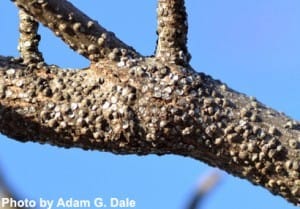
Big cities with large expanses of concrete, asphalt, and buildings are usually warmer than the suburbs or countrysides that surround them, a phenomenon known as the urban heat island effect. Now new research from North Carolina State University shows that these urban heat islands increase the number of young produced by the gloomy scale insect — a significant tree pest — by 300 percent, which in turn leads to 200 times more adult gloomy scales on urban trees.
